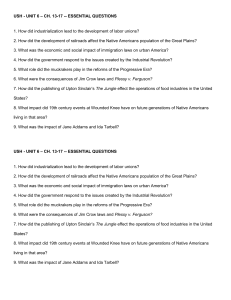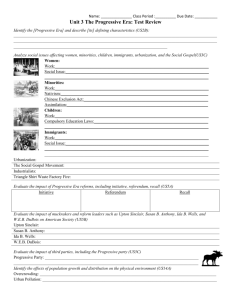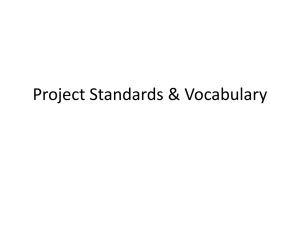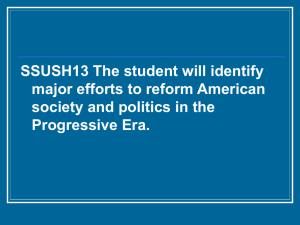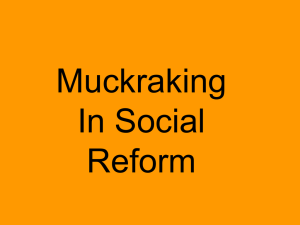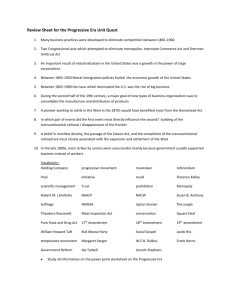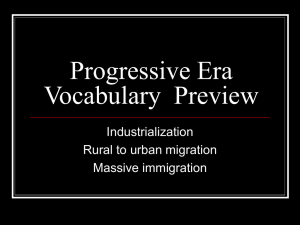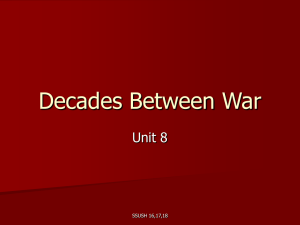File
advertisement
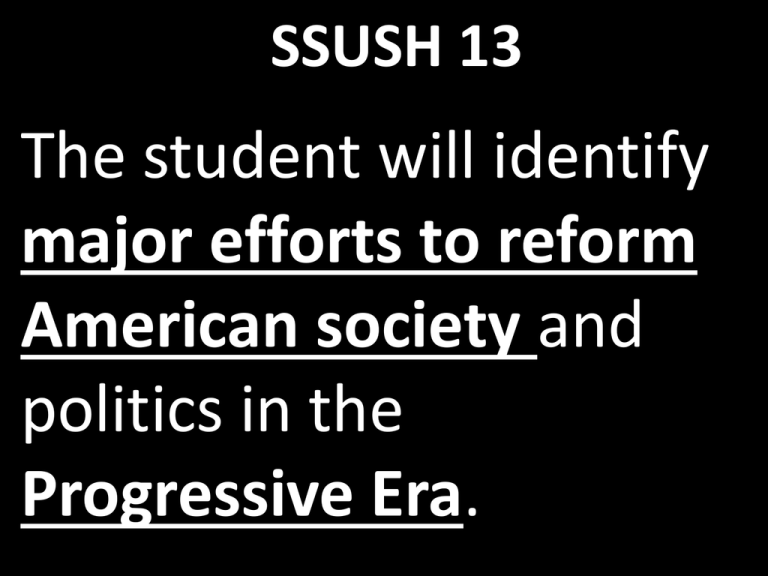
SSUSH 13 The student will identify major efforts to reform American society and politics in the Progressive Era. Characteristics Definition The movement that called for more government action in the regulation of business, and called for laws governing morality, and city development to improve societies ills. Minimum Wage laws Child labor laws 40 hr work week laws Safety laws Laws protecting unions : Examples Meat Inspection Act Conservation movement Progressive Era Non-Examples Laissez faire “hands off” SSUSH 13a Explain Upton Sinclair’s The Jungle and federal oversight of the meatpacking industry. Characteristics Definition Journalists that used writing to expose corruption, government scandal, or the wrongs in society. Inform public Influence government policy Cause change in society : Muckraker Examples Upton Sinclair – Chicago meatpacking Ida Tarbell – The History of Standard Oil Non-Examples Literature that covers up and hides scandals and wrongs. • PROGRESSIVES - Those who supported the reforms (changes) of the Progressive Era. They believed things could made better by Theodore Roosevelt labeledbe them muckrakers because he said they government reforms. stirred up & uncovered much of the • Muckrakers“muck” ofJournalists US society. that investigate and exposes social ills like political corruption, Child labor, and social issues in their writing. Upton Sinclair • Exposed the unsanitary methods used in the Chicago Meatpacking Industry. • Sinclair stated, “I aimed for the publics hearts, and accidentally hit its stomach!” • Theodore Roosevelt pushed for passage of the Meat Inspection Act after reading. Significance Influenced Congress to pass the meat inspection Act. Government regulated the industry by making it inspect meat and mark it to show it was safe for human consumption SSUSH 13d Explain Ida Tarbell’s role as a muckraker. Ida Tarbell • Ida Tarbell was a muckraker that exposed the unfair business practices used by John D. Rockefeller in forming the Standard Oil Company into a trust. Significance Influenced Congress to pass anti-trust laws, or laws to keep businesses from forming monopolies. The most popular was the Sherman Anti-Trust Act. These laws were examples of how the government began to regulate businesses and industry because of political pressure caused by literary works written by muckrakers. OTHER MUCKRAKERS Muckraker Thomas Nast Jacob Riis Ida B. Wells Work Political Cartoons How the Other Half Lives (1890) A Red Record (1895) Subject Political corruption by NYC's political machine, Tammany Hall, led by Boss Tweed. Living conditions of the urban poor; focused on tenements. Provided statistics on the lynching of AfricanAmericans. Results Tweed was convicted of embezzlement and died in prison. NYC passed building codes to promote safety and health. NAACP joined the fight for Federal anti-lynching legislation. SSUSH 13b Identify Jane Addams and Hull House and describe the role of women in reform movements. Social Gospel Movement • Preached salvation through service to the poor. • Reformers such as Jane Addams and her Hull House of Chicago responded. • Encouraged government action and regulation of business and corrupt politics. • Encouraged social programs by the government Jane Adams – Hull House • Purpose was to help inner city “Urban” poor. • Immigrants learned how to read, write, and speak English. • Night school for adults, kindergarten classes for kids, clubs for older children, a public kitchen, IMMIGRANTS HULL SETTLEMENT ECONOMICS MEDICAL LEGAL English Language URBAN SOCIAL IMMIGRANTS SSUSH 13c Describe the rise of Jim Crow, Plessy v. Ferguson, and the emergence of the NAACP. Characteristics Definition Social and legal laws that were meant to separate the races in society. Black & White water fountains Black & White Schools : Jim Crow Examples Blacks had to move to the back of the bus to allow white people to sit up front. Blacks could not eat in white restuaraunts. Non-Examples Brown v. Board of Education (1954) Jim Crow Era • Laws passed from 1870s to 1880’s in various states. • Took away newly won rights of African Americans- especially right to vote. • Examples: Poll tax, literacy test for voting, grandfather clause • Separate public facilities for races. Booker T. Washington • Founder of Tuskegee Normal & Industrial College • Encouraged blacks to seek technical training for jobs to be accepted into white culture. • Blamed black poverty on blacks and urged them to accept discrimination. W.E.B. Du Bois • Criticized Washington’s ideas • Encouraged blacks to seek higher education and become leaders (lawyers, doctors, politicians, etc.) so that they could fight discrimination in court and society. • Wanted immediate social and economic equality for African Americans NAACP • National Association for the Advancement of Colored People • Aimed to full equality among the races. Full civil rights for African Americans. • W.E.B. Du Bois helped establish this group Plessy v. Ferguson (1896) • Established “Separate but Equal” doctrine. • Ruled that it was not unconstitutional to separate the races as long as they had equal services. • Segregation (separation of races) legal. Homer Plessy SSUSH 13e Describe the significance of progressive reforms such as the initiative, recall, and referendum; direct election of senators; reform of labor laws; and efforts to improve living conditions for the poor in cities. Planks in the Populist Party Platform Direct Election of U.S. Senators Secret Ballot Party bosses controlled state legislatures that elected representatives to the U.S. Senate. To limit this control, the Populists proposed allowing citizens to directly elect U.S. Senators. Privacy at the ballot box would ensure that citizens can cast votes without party bosses knowing how they voted. Initiative A proposal for a law that originates with state citizens and bypasses the legislature and gets on the ballot by the petition process. Referendum A process where legislatures place a proposed law on the ballot to allow citizens to vote law into effect. Recall Direct Primary Would allow voters to petition to have an elected representative removed from office. Designed to ensure that voters select candidates to run for office, rather than party bosses. Senators Chosen Elected th 17 Before Amendment Progressivism Progressive Era Federal Legislation Required that companies accurately label the ingredients Pure Food and Drug Act contained in processed food items. (1906/1911) Meat Inspection Act (1906) In direct response to Upton Sinclair's The Jungle, this law required that meat processing plants be inspected to ensure the use of good meat and health-minded procedures. Progressive Era Federal Legislation Cont… Hepburn Act (1906) Federal Reserve Act (1913) Clayton Antitrust Act (1914) Federal Trade Act (1914) Strengthened the Interstate Commerce Commission, allowing it to set maximum railroad rates. Created 12 district Federal Reserve Banks, each able to issue new currency and loan member banks funds at the prime interest rate, as established by the Federal Reserve Board. Strengthened the Sherman Antitrust Act by outlawing the creation of a monopoly through any means, and stated that unions were not subject to antitrust legislation. Established the Federal Trade Commission, charged with investigating unfair business practices including monopolistic activity and inaccurate product labeling. Progressive Era Amendments 16th (1913) Granted Congress the power to tax income. 17th (1913) Provided for the direct election of U.S. Senators. 18th (1919) Prohibited making, selling, or transporting alcohol. 19th (1920) Provided women suffrage (voting). SSUSH 13f Describe the conservation movement and the development of national parks and forests; include the role of Theodore Roosevelt. Theodore Roosevelt • Fought in the Spanish American War • Oversaw building of the Panama Canal • Led the Rough Riders at the Battle of San Juan Hill • Issued the Roosevelt Corollary (an extension of the Monroe Doctrine) • Preservation or Conservation of U.S. Natural resources. Characteristics Definition The setting aside land to preserve it from the devastating effects of industrialization and the closing of the frontier. To keep land from businesses. Not allow homes or industry to clear trees and forests. Protect by government law. : Conservation Examples Yellow Stone National Park Yosemite National Park Non-Examples Land for mining, excavating for oil, gold, iron ore, or marble. National Parks - Conservation SSUSH 14 The Student will explain America’s evolving relationship with the world at the turn of the twentieth century. SSUSH 14a Explain the Chinese Exclusion Act of 1882 and anti-Asian immigration sentiment on the west coast. Chinese Exclusion Act • Law passed in Congress in 1882 to restrict the immigration of Chinese into the United States. • Was not repealed until 1943 Characteristics Definition The idea of opposing immigration of cultures that were different. Usually leads to violence and discrimination and based on fear of different cultures. Do not like Catholics. Do not like Communists. Do not like Chinese. : Nativism Examples Chinese Exclusion Act Racism Non-Examples Equal employment Civil Rights Equality under the Law
